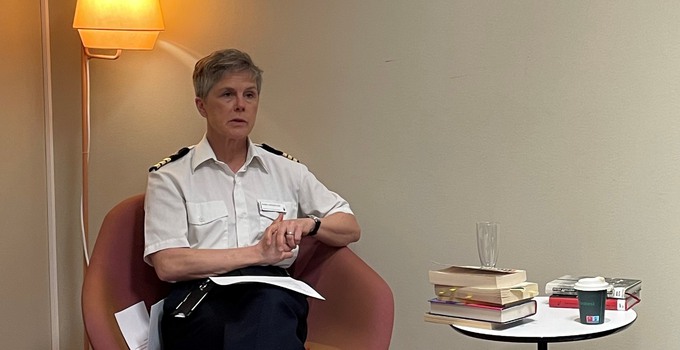Relay leg 1
Presentation from the first leg of the book relay on April 3, 2025.

Johanna (Hanna) Jungwallius
Non-fiction
Michelle Dean, Sharp: The Women Who Made an Art of Having an Opinion
I chose this book because it is so inspiring. Perhaps it is more accepted for young women to take their place in the intellectual debate today. This was not always the case for those of us who started our professional careers before the turn of the millennium. But this is definitely not a book for middle-aged people! It's a book for anyone who can relate to Dean's book dedication "For every person who's ever been told, 'You're too smart for your own good!'". By portraying a number of women who have served in public debates, Dean reminds us of the importance of standing up for one's opinions and doing so with impeccable intellectual integrity and sharpness. This is a book that describes in a nuanced way both these women, who often took personal risks with their outspokenness and had to endure harsh, public criticism, but who were also praised and respected. Dean provides several examples of the sharpness of these writers and examines how their public views were often seen as provocative or controversial. She also explores how women's intellectualism is often judged through a gender perspective, where women were often (and sometimes still can be considered) "unmanageable" in a way that did not apply (or sometimes still applies) to men in the same position.
Yuval Noah Harari, 21 Lessons for the 21st Century
I have always been curious about how current and complex issues affect us, both as individuals and as a society. I believe that it is precisely the drive to understand, rather than to explain, that makes Yuval Noah Harari's reasoning in 21 Lessons so captivating. My own copy is well used, with dog ears, post-it notes and graffiti all over the pages. Harari takes a broad approach and touches on topics such as the rapid development of AI, the role of religion for individuals and societies, and various political challenges. Already in the book's introduction, Harari sets the tone for what I think he wants to achieve:
"No book can do justice to all of that, I don't have lessons to teach people in such situations. I can only hope to learn from them."
This approach, realizing that we do not have all the answers but that we can constantly learn from others, is something that appeals to me and that I think we can all benefit from – regardless of whether we are managers, educators or students. 21 Lessons show that it is in our doubts and when we realize that we are wrong that we can really take advantage of our curiosity to understand more.
Fiction
Ian McEwan, Saturday
McEwan is one of my favorite authors because he addresses and portrays difficult, but at the same time universal human issues. He doesn't shy away from our darker sides and his characters are often very relatable. I like his sparse way of painting environments. He can describe something deeply unpleasant in a fairly objective way and this rather analytical, restrained narrative style gives me room to interpret and bring to life what happens in the book. Saturday is a psychological thriller. It is about how a relatively well-to-do middle-class family is suddenly taken hostage in their own home. Relationships and values are put to the test. And questions such as what is really important come to a head in this tight novel. If you have only read (or seen the film) Atonement, there is much more of McEwan's writing to discover!
Shehaan Karunatilaka, The Seven Moons of Maali Almeida
If McEwan has a restrained language, Karunatilaka takes it out of the swing of things. This is a fantastic, colorful read. I've never been to Sri Lanka, but Karunatilaka takes me there when the civil war sweeps across this beautiful country. Death, decay and sorrow are depicted together with the beauty of the country and people's joy of life. The pragmatic exists together with the supernatural. It is a multifaceted novel full of contrasts that gives the reader an insight into the country's complex and often turbulent history, culture and social problems. Letting the main role be taken by the soul of a murdered young man is a fantastic way to give perspective to both the events and the other, living people in the story. I really appreciated the contrasts (life/death, faith/doubt, friendship/hatred) that the author gives – they gave a deeper dimension to what I think Karunatilaka wants to tell.
Eva Figes, The Knot
This is a small book with a large content. I chose this one because of the way Figes puts the power of language at the center of the story. It follows a person – perhaps mainly in how he communicates with himself and with others – from the time he is born until he is an adult. It is written in a way that makes me as a reader listen to the newborn or small child's non-verbal experiences of the world and later to the adult's own verbalized thoughts and communication with others. The Knot provides a poetic, perhaps even musical reading experience. Where Karunatikala strikes with an entire orchestra's colourful "extra everything", Fige's novel whispers to the reader. This is a beautiful story about the importance of language for a person and how language acts as a link outwards to other people but also inwards to ourselves and our own experiences.
